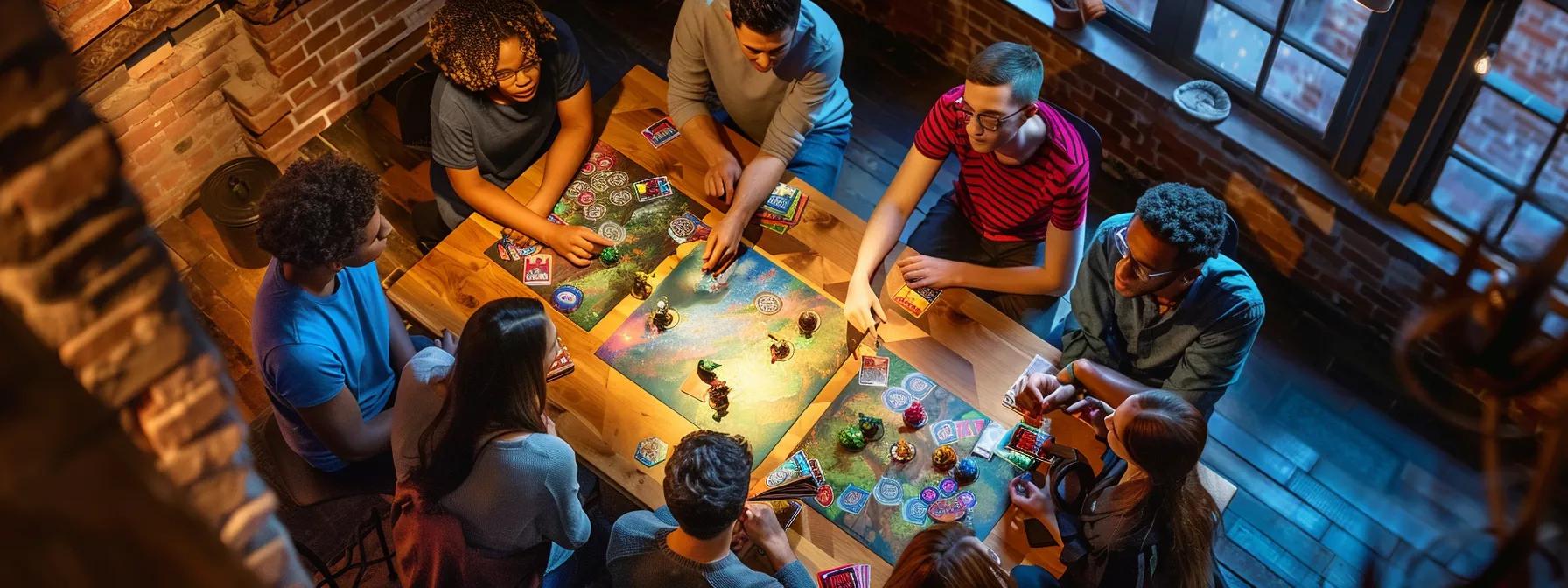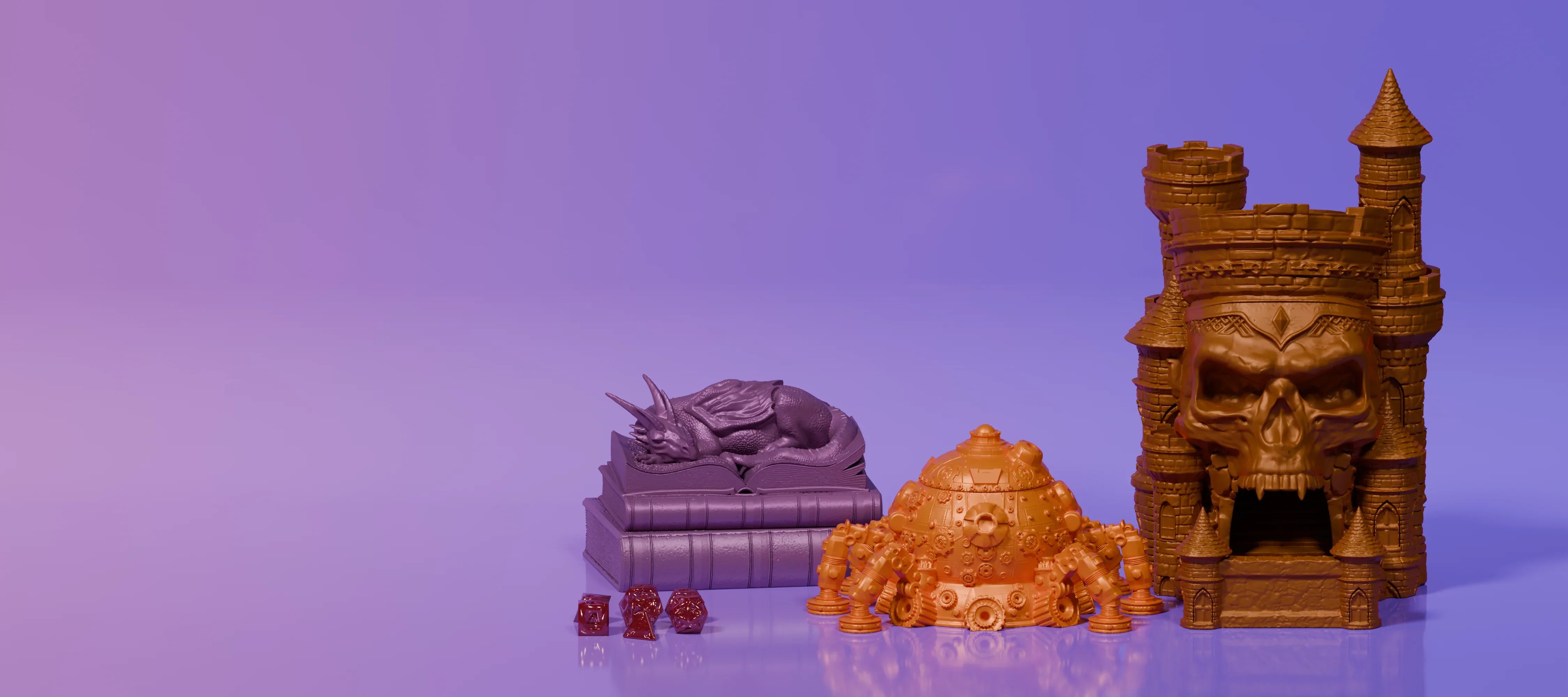
Dungeons & Dragons: A Look at Nerd Culture's Growth
Hey, pull up a chair. Let’s talk about something you might’ve wondered while arranging your dice or organizing minis: is playing Dungeons & Dragons still considered “nerdy”? Or has it finally leveled up to something more?
We’re digging into how D&D shook off the old stereotypes, how pop culture helped roleplay roll a nat 20 on public opinion, and why “nerdy” has gone from insult to identity. Along the way, we’ll chat about the benefits of collaborative storytelling- like creativity, problem solving, social bonds, and even personal growth, and how little things (like having a character vault or tidy dice tray from Fabletop.co) help support a more connected and confident game night.
By the end, you’ll see D&D isn’t just a game- it’s a shared adventure that says a lot more about who we are than it used to.
Alright, let’s rewind a bit and see where all this started…
Deconstructing the "Nerdy" Label Associated With D&D

Historical Perceptions of Dungeons & Dragons Players
In the past, playing D&D was linked with being socially awkward and isolated- an escape into elaborate fantasy worlds away from everyday challenges. Roleplaying was seen as a niche activity for eccentrics preferring solitude over mainstream social life. Early media often portrayed D&D players as misunderstood loners or cult figures, reinforcing a stigmatized image of “nerdiness.” Over time, however, the rewarding experience of collaborative storytelling began to change these views.
How Pop Culture Shaped the Image of D&D
Pop culture has been central in transforming public perceptions of D&D. Iconic films, TV series, and celebrity endorsements recast roleplaying as a respected form of creative expression. Advertisements and cameos leverage D&D imagery to evoke feelings of adventure and camaraderie, softening old stereotypes. As a result, the idea of being “nerdy” has come to be associated with innovation, creativity, and fun.
Understanding the Evolution of "Nerd Culture"
Once a negative label, “nerd” is now a badge of honor. Modern celebrations of technology, science fiction, and fantasy have redefined the term as a passionate expression of specialized interests. Today’s nerd culture embraces intellectual curiosity and a love for storytelling, allowing enthusiasts to reclaim “nerdy” as a symbol of expertise, imagination, and the ability to bridge diverse realms of knowledge.
Is Playing DND Nerdy in Today's Society?
Today, "nerdiness" is fluid and even fashionable. Playing D&D is viewed as a creative, strategic endeavor rather than mere escapism. With a diverse range of players- from celebrities to business leaders - D&D has shed its old stigma. Identifying as a D&D enthusiast now means being part of a savvy, innovative community that values deep communication, collaborative problem solving, and expansive imaginative worlds.
Reclaiming "Nerdy" as a Positive Trait in Gaming
Embracing D&D means embracing the rich experiences it offers. Being nerdy now signifies being informed, creative, and passionate about topics once marginalized. Modern players use the term to denote intellectual curiosity, humor, and a willingness to explore unconventional ideas.
Whether using a detailed character sheet or engaging in spontaneous roleplay, playing D&D celebrates the positive aspects of D&D's nerd culture and promotes an inclusive gaming community. Even items like creative dice tower uses add flair and function to the table, becoming a subtle but meaningful part of the modern nerd aesthetic.
The Rise of D&D Gaming Now a Mainstream Phenomenon

Factors Fueling Dungeons & Dragons' Popularity Surge
D&D’s popularity has surged thanks to online streaming and social media. Shows like “Critical Role” have attracted diverse audiences by merging storytelling with digital media. Beyond online visibility, the growing cultural acceptance of geek culture and the revival of comic fandoms have helped D&D move from basement sessions to public events and conventions where it is celebrated as a collective art form.
From Niche Hobby to Celebrated Pastime
D&D has evolved from a niche hobby to an inclusive activity for people of all ages and backgrounds. Whether playing at public events or online, the strong sense of community highlights that roleplaying offers valuable life skills, including critical thinking and creativity. Nostalgia, combined with innovative adaptations, keeps the game relevant and respected among mainstream audiences.
The Impact of Streaming and Actual Play Shows
Streaming and actual play shows have revolutionized D&D by demystifying gameplay for newcomers. Watching experienced Dungeon Masters and players navigate clever narratives and humorous moments makes the game accessible. These shows highlight spontaneous creativity and the social, personal development aspects of D&D, turning online spectators into active players.
D&D's Growing Visibility in Media and Entertainment
D&D’s imagery now appears in movies, TV shows, and video games, making its storytelling style a shared cultural language. References to dragons, enchanted dungeons, and iconic character classes like the rogue or barbarian appear in commercials and media, bridging traditional roleplaying with contemporary entertainment and uniting diverse groups through a common cultural reference.
Statistics Showing the Growth of D&D Players
Recent indicators reveal exponential growth in D&D’s player base. Surveys suggest that millions now actively engage with the game, with a notable rise among traditionally underrepresented groups. Platforms like Twitch and YouTube have recorded billions of views for D&D streams, underscoring its cultural staying power and mainstream acceptance.
Embracing Nerdiness the Appeal of Imaginative Play
Why Creative Storytelling Captures Modern Audiences
Modern audiences love creative storytelling that offers unique narratives and alternate realities. D&D’s immersive experience comes from blending structured mechanics with endless storytelling possibilities. This process not only entertains but also encourages personal investment and cognitive growth as players tackle complex challenges and plot twists.
The Joy of Collaborative World-Building
One of D&D’s most enchanting features is its collaborative world-building. Every player contributes to a shared narrative, creating a rich tapestry of evolving lore. This cooperative creation turns what might be a solitary hobby into a vibrant social experience, teaching the value of teamwork and unity as players build imaginative worlds together.
Escapism and Stress Relief Through Tabletop Roleplaying
D&D offers an escape from everyday stress by transporting you to a fantastical realm where you can be a knight, rogue, or wizard. This imaginative journey provides valuable stress relief and mental clarity, offering both intellectual challenge and the freedom to explore and innovate. As many players have found, D&D boosts mental health by promoting emotional resilience and offering a structured outlet that supports mental health through creativity and connection.
Building Unique Characters and Narratives
Every character created in D&D reflects the player’s imagination, ideals, and quirks. The process of selecting traits, building backstories, and forming intricate relationships transforms gameplay into a deeply personal narrative. Whether you choose a lone ranger or a charismatic bard, character creation in D&D is an exercise in self-expression and storytelling.
The Allure of Fantasy and Adventure in D&D
At its core, D&D is an invitation to a realm of fantasy and adventure where reality blurs into myth. This escape from the ordinary is a powerful draw for those seeking excitement and creativity. The possibility of confronting mythical monsters and exploring enchanting realms creates a dynamic experience that constantly renews its sense of adventure and wonder.
Social Connections Forged Through Dungeons & Dragons
D&D as a Catalyst for Friendship and Community
A standout benefit of D&D is its ability to bring people together. Whether gathered around a table or in an online session, the game builds deep camaraderie through shared storytelling and challenges. The friendships forged extend far beyond the game, forming a supportive community where every member’s contribution is valued.
Finding Your Tribe in the Tabletop Gaming World
The diverse landscape of tabletop gaming makes it likely for you to find like-minded players. D&D communities are known for their inclusivity, welcoming people from all backgrounds. Whether you join local game stores, online forums, or community conventions, you’ll discover a network that not only values creativity but also supports your personal and social growth.
How Cooperative Gameplay Strengthens Bonds
Cooperative gameplay is central to D&D, requiring synchronized decision-making and teamwork. Every campaign decision- be it in battle or story plotting- is made collectively, reinforcing communication and trust. This collaboration naturally enhances social skills, helping build bonds that extend into everyday life.
Inclusive Gaming Spaces and Diverse Player Bases
Today’s tabletop gaming spaces are markedly diverse and inclusive. Safe, welcoming communities allow individuals of all backgrounds to share their love for D&D without judgment. This supportive environment transforms roleplaying from an isolating activity into a vibrant celebration of multicultural perspectives and creative storytelling.
Overcoming Social Awkwardness With D&D
For those intimidated by new social settings, D&D offers a structured framework that eases social interaction. The game’s rules and shared goals reduce pressure, allowing gradual engagement through playful banter and collaborative problem solving. These shared challenges help break the ice, fostering confidence and a sense of belonging.
Cognitive and Personal Benefits of Playing D&D
Developing Problem-Solving Skills Through Gameplay
D&D challenges your mind by presenting puzzles, moral dilemmas, and strategic battles that require high-level reasoning. Whether deciphering ancient riddles or planning a tactical move against a dragon, regular gameplay sharpens decision-making skills that benefit academic and professional arenas.
Enhancing Creativity and Improvisational Abilities
The creative freedom in D&D is a rich training ground for improvisation. Each campaign becomes a canvas for spontaneous dialogue and unexpected plot twists, boosting your ability to think on your feet. This skill translates into improved public speaking, brainstorming, and problem solving in real-life scenarios.
Improving Communication and Teamwork
Effective communication is vital in D&D. As you share ideas and collaboratively build storylines, you naturally hone both verbal and non-verbal communication. This practice not only enhances in-game success but also builds skills useful for group tasks at work, school, or social settings.
Building Confidence and Leadership Qualities
D&D provides a low-stakes environment where you can experiment with leadership. Guiding a party through challenging situations and negotiating with non-player characters helps build self-confidence and effective leadership skills that can extend into professional and personal life.
Learning Empathy Through Roleplaying Diverse Characters
Stepping into roles with varied backgrounds fosters empathy. By experiencing different perspectives and moral dilemmas, you learn to appreciate diverse views and develop a more inclusive outlook on life- a benefit that enhances both gameplay and real-life interactions.
The Expanding Universe of Tabletop Gaming Beyond D&D

Exploring Different Genres of Tabletop Roleplaying Games
While D&D leads in tabletop roleplaying, the broader universe of TTRPGs includes genres from science-fiction epics to horror adventures and cyberpunk tales. Experimenting with these different styles can broaden your understanding of storytelling and even provide fresh ideas to enhance your D&D campaigns.
The Resurgence of Board Games and Strategy Games
Alongside roleplaying, board and strategy games have seen a significant revival. These games emphasize teamwork, creative problem solving, and strategic planning. Organized events and tournaments not only enrich your social network but also introduce you to new gaming mechanics that complement the roleplaying experience.
How D&D Paved the Way for Other Indie RPGs
D&D’s success set the stage for many indie RPGs that push creative boundaries with innovative mechanics and fresh narratives. Inspired by D&D’s collaborative spirit and expansive lore, these games offer alternative experiences, from traditional dungeon crawls to experimental storytelling - that continue to reflect the evolving world of roleplaying.
Similarities and Differences Between D&D and Other TTRPGs
Though varied in theme and mechanics, many TTRPGs share a focus on collaborative storytelling and creative problem solving. Compared to other games that may emphasize narrative freedom over structured combat, D&D’s system of character classes and defined mechanics offers a unique balance that appeals to a wide range of players.
Finding the Right Tabletop Game for You
The expanding landscape of tabletop games means many options await. Whether you prefer deep strategic challenges or a relaxed session full of humor and creativity, understanding your interests will help you find the game that best fits your style and social needs.
Addressing Common Misconceptions About Dungeons & Dragons
Separating Myth From Reality in D&D Gameplay
Many myths portray D&D as overly complex or anti-social. In truth, the game offers clear rules and an intuitive structure that supports immersive, collaborative storytelling. By debunking outdated media portrayals, it becomes clear that D&D fosters inclusion and teamwork in a flexible environment.
Is D&D Overly Complicated for Newcomers?
While D&D may seem intimidating at first, its core rules are designed to be accessible. Many communities provide guided sessions and introductory campaigns to help beginners quickly grasp the basics. With a welcoming group and a gradual learning curve, beginners soon find that the game’s depth only enriches the experience.
The Time Commitment Involved in Playing D&D
A common concern is that D&D requires a large time commitment. Although campaigns can span months or years, many groups now offer one-shot adventures or shorter arcs suited to busy schedules. This flexible format allows everyone to enjoy the rich, communal experience without feeling overwhelmed.
Dispelling Outdated Stereotypes About Players
Old stereotypes of D&D players as isolated nerds are no longer accurate. Modern players come from diverse backgrounds - students, professionals, artists, and public figures -all of whom contribute to a dynamic gaming community that values individuality and shared narrative adventure.
Understanding the True Nature of D&D Campaigns
Though D&D campaigns can appear daunting with intricate plots and character development, at their heart they are about organic storytelling and fun. Every session is a collaborative effort where setbacks become opportunities, and predefined rules mix with spontaneous creativity to create a unique adventure each time.
Getting Started With Dungeons & Dragons for Beginners

Essential Tools and Resources for New Players
For newcomers, the essentials are a character sheet, polyhedral dice, and a basic rulebook (like the Player’s Handbook). Numerous online resources, forums, and tutorial videos can guide you through character creation and game mechanics, making the initial learning process smoother.
Finding a D&D Group Online or Locally
Finding the right group is key. Look for local game shops, community events, or online platforms such as Discord and Roll20 that host beginner-friendly sessions. Searching “D&D groups near me” or “beginner D&D sessions” can connect you with communities ready to welcome new players.
Your First Steps as a Player or Dungeon Master
Starting with a pre-made adventure is an excellent way to ease into D&D. As a player, learn how your character sheet translates into actions in the game world. This approach works particularly well when introducing D&D to kids, allowing younger players to grasp the basics through guided play. Combined with a user-friendly D&D online experience- through tools like Roll20 or D&D Beyond, new players can engage with the game in ways that match their comfort and learning pace.
Learning the Basic Rules and Game Mechanics
Understanding basic rules, initiative, combat, skill checks, and roleplaying etiquette - is fundamental. Beginner-friendly resources like the Player’s Handbook and tutorial videos can help you quickly grasp these concepts. As you play, you’ll naturally learn and adapt, building a strong foundation for future adventures.
Tips for a Positive First D&D Experience
Keep an open mind, communicate with your group, and be willing to experiment. Establishing a few ground rules during your first session (like open dialogue and a lighthearted approach to mistakes) can create a welcoming atmosphere. Celebrating small victories and maintaining a fun mindset will set you on a rewarding journey.
The Future of D&D and Its Place in Nerd Culture
Innovations in Dungeons & Dragons Gameplay and Technology
Technological advancements are breathing new life into D&D. Interactive digital tools, augmented reality, and online voice platforms are making sessions more immersive with dynamic virtual maps and real-time animations. These innovations streamline gameplay and open up new experiences for players comfortable with digital interfaces.
How D&D Continues to Evolve With Its Audience
D&D adapts alongside its diverse audience. Continuous updates to rules and lore address inclusivity and cultural diversity, reflecting feedback from a passionate community. This evolution ensures that the game remains relevant and engaging for players with varied interests and backgrounds.
The Enduring Legacy of Dungeons & Dragons
D&D’s legacy extends beyond its rulebooks; it has impacted genres in video games, literature, and film. By continuing to play, you not only honor a cherished tradition but also contribute to an ever-expanding narrative tapestry. The game’s communal storytelling has a timeless appeal that grows with each new campaign and digital innovation.
Predictions for the Continued Rise of D&D Gaming
Looking ahead, D&D is expected to keep rising in popularity. As virtual and augmented reality become more mainstream, even more immersive experiences are likely. With its focus on inclusivity, accessibility, and rich narrative, D&D is poised to remain a global cultural phenomenon celebrated across many platforms.
Nerdiness as a Celebrated Aspect of Modern Identity
What was once seen as “nerdy” is now a celebrated indicator of individuality and passion. Embracing D&D means proudly claiming a part of geek culture- where innovation, resourcefulness, and creativity are valued. Every dice roll becomes a statement of enthusiasm for uniqueness and intellectual exploration.
Personal Stories Embracing the D&D Experience

Testimonials From Players on Why They Love D&D
Many players share heartfelt stories about the transformative power of D&D. The game has provided solace, forged lifelong friendships, and sometimes even inspired career changes. These testimonials highlight that D&D is more than entertainment- it is a supportive community that nurtures personal expression and creativity.
How D&D Transformed Perceptions of "Being Nerdy"
Personal experiences reveal that playing D&D has reshaped what it means to be nerdy. Players recount moments of pride as they openly celebrate their love of the game, evolving from feelings of social isolation to embracing their intellectual passions as strengths.
The Positive Impact of D&D on Individuals' Lives
Beyond casual gameplay, D&D has helped many improve communication, teamwork, and leadership skills. The game’s structured narrative and cooperative environment serve as a safe space to work through personal challenges while fostering emotional resilience and confidence.
From Skeptic to Enthusiast Journeys Into D&D
Stories from former skeptics illustrate how the game overcomes initial doubts. Many who once questioned the value of fantasy roleplaying eventually found themselves captivated by D&D’s narrative depth and collaborative spirit, leading to lasting friendships and personal growth.
Why People Proudly Identify as D&D Players
Ultimately, many proudly embrace their identity as D&D players because the game uniquely blends creativity, teamwork, and continual evolution. It’s not just about rolling dice or building characters, it’s about joining a community that celebrates imagination and innovation, making every game an opportunity to grow and express yourself.
Final Thoughts
Dungeons & Dragons has transformed from a misunderstood niche into a celebrated cultural phenomenon that enriches lives and builds inclusive communities. This article has shown how the historical “nerdy” label became a badge of honor, highlighted D&D’s mainstream rise, and detailed its social, cognitive, and personal benefits. As you explore or return to D&D, remember that your passion for storytelling and adventure is valid and valuable. Embrace your inner nerd, and let the legacy of D&D inspire your next epic journey.
Frequently Asked Questions
Q: What exactly defines "nerdy" in the context of Dungeons & Dragons? A: In D&D, being "nerdy" means having a passion for deep storytelling, complex game mechanics, and strategic problem solving. It also represents embracing unique interests in a way that brings people together.
Q: How has pop culture influenced the perception of D&D players? A: Pop culture has transformed D&D’s image by highlighting its creative and collaborative aspects through television, movies, and streaming. This exposure dispels old stereotypes and shows that being a roleplayer is both innovative and socially engaging.
Q: Can playing D&D help improve real-life problem-solving and communication skills? A: Yes, D&D challenges you to solve complex problems and make strategic decisions while encouraging effective communication. These skills naturally translate into everyday interactions in both professional and personal settings.
Q: How can a beginner find a D&D group or campaign? A: Beginners can locate groups by visiting local game stores, participating in online communities on Discord or Roll20, or searching for “D&D sessions for beginners” in local forums. Many groups offer introductory sessions to ease the learning curve.
Q: What tools do I need to start playing D&D? A: Essential tools include a character sheet, polyhedral dice, and a basic rulebook like the Player’s Handbook. Online resources and community tutorials further assist in understanding game mechanics and starting your first session.
Q: How long does it take to feel comfortable with D&D rules and gameplay? A: The learning curve varies by experience, but many players begin feeling comfortable after a few sessions. One-shot adventures can help ease the process without a long-term commitment.
Q: How is modern D&D different from previous editions? A: Modern editions focus on inclusivity, streamlined gameplay, and accessibility. Updates incorporate digital tools and enhanced storytelling options, making the game appealing to both longtime fans and newcomers.




